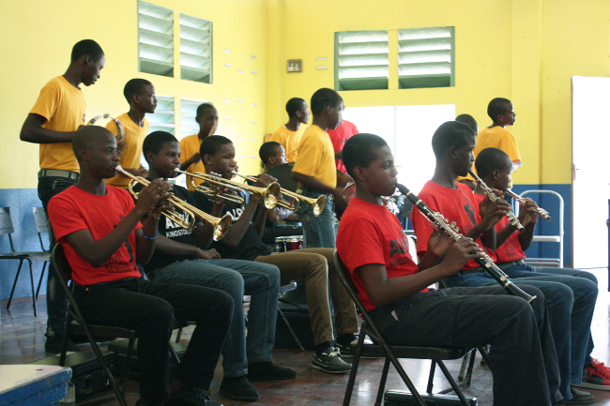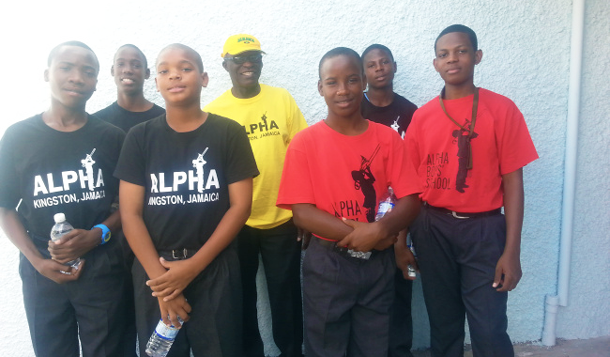
At 6am every day, the students at Alpha School for Boys in Kingston Jamaica start the morning with a series of chores, before settling down to breakfast and beginning the academic day. But Alpha is not your average school. What began life as an orphanage has since gone on to become the bedrock of ska, reggae and dancehall.
Founded in 1880 by nuns from the Sisters of Mercy, its ability to turn around the lives of disadvantaged children has produced the likes of Yellowman, Leroy Wallace and Dizzy Reece and students have gone on to play with everyone from Bob and to Toots and the Maytals. Snoop Dog even featured the school in his 2013 documentary Reincarnated.
Students are only referred to Alpha through a court order. Within an intake solely of children and young adults who come from some of the capitals most violent and disadvantaged backgrounds, respect and discipline are at the core of Alpha’s ethos.
Matthew, aged 15, has been at Alpha for three years. He had never contemplated a life in music before, but after hearing about the school’s band he became enthralled. “Alpha showed me the right path, which is music - it’s sweet combination of song and rhythm.”
Central to the school’s success are the teachers and professionals that have become the driving force behind its unique reputation. Winston “Sparrow” Martin has been teaching Alpha students for over 26 years, and is the longest serving bandmaster in the school’s history. Once a student himself, Sparrow played in the prestigious Jamaica Military Regiment Band and performed with Otis Redding, before returning to teach at the place where he was once a pupil.
At nine years old Sparrow was referred to Alpha after his truancy become unmanageable, and like most of Alpha’s students he struggled to adapt to the stringent atmosphere of his new home. It was during an attempt to skip band practice, where renowned teacher Sister Ignatius found him perched up a tree in the rain and coined the pet name that has stuck ever since.
On par with South Africa and Colombia, Jamaica is one of the world’s most violent countries. According to the 2014 UN Office of Drugs and Crime the country has the 10th highest murder rate in the world, stepping down from its former position of 6th in the 2013 UN Global Report on Homicide. But despite the decline in violence, the country still faces an onslaught of vicious gang crimes and endemic corruption.
Having to both manage and educate students who have had direct experience of often violent or unstable backgrounds can prove challenging but the school’s success stories speak for themselves.
I asked Matthew if he feels Alpha has prepared him for life beyond the school, “When we are outside we will be able to know how to talk to people, how to treat people, how to handle ourselves amongst people. It’s changed my life.”

But in the wake of recent funding cuts and an escalation of violent incidences between pupils, Alpha has hit a crossroads. In March the school had to make the difficult decision of closing its boarding facilities, continuing instead as a day school.
With hard times ahead, the iconic institution is still determined to maintain its creative heritage by branching out beyond traditional band music and into the realm of design and fashion.
Recently, Alpha launched its own radio station after a successful Kickstarter campaign to fund a new production studio, and students have begun designing and selling their own t-shirts. Joshua Chamberlain, now Director of Alpha, told me why the school decided to shake up its curriculum. “It seemed like a logical next step. Alpha is really about students getting employed after leaving, so as a musician it’s natural to be comfortable in a studio environment.”
Exposing students to a wide-range of skills is vital to preparing them for a life beyond Alpha when they eventually leave at age 18. Brad, 14, is part of the school’s new screen-printing programme and hand prints all the t-shirts himself. I asked him if he wants be a designer when he leaves Alpha; ‘Yeah, I like the fashion; fashion is a part of what I want to be, but I also I want to be a soldier and a footballer.”
Alpha Wear clothing was originally launched featuring two designs by Michael Thompson. Inspired by the school’s musical heritage, its look book features artists such as Yellowman, Chronixx and DJ Conscience. The designs are created alongside students who are then taught how to make them in the school’s workshops.
Trace Mamoun, the Special Projects Coordinator at Alpha, told me that entrepreneurship comes naturally to students. “These kids are very capable, they know how to make money and sell. They’re like businesses men because some have had to think like that from a very young age.”
I asked some of the boys about what their friends from other schools think of Alpha but I’m told by a supervisor that ‘talking about personal lives isn't something we really want to get into’. Some have been involved in gangs, some are in witness protection, others have lost parents or come from unstable homes. The volatile nature of pupil’s past lives means managing students can be difficult, but without the secure environment and creative outlets offered by Alpha the alternatives for some of the children aren’t worth contemplating. Despite the school’s recent setbacks, perhaps the place that witnessed Dizzy Reece put down his baritone saxophone and pick up his trumpet will live to see a new generation of students switching big band practice for mixing and scratching.